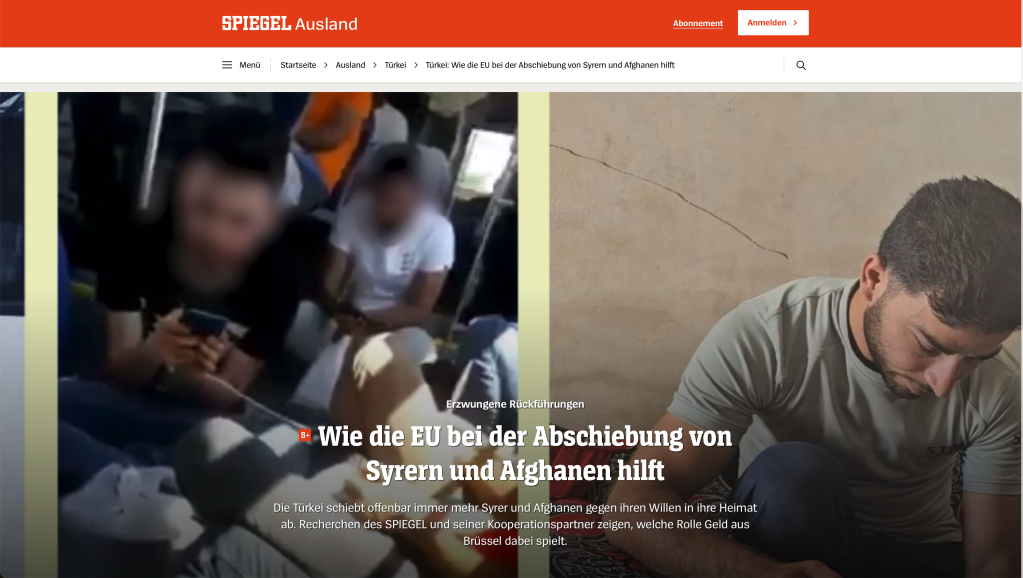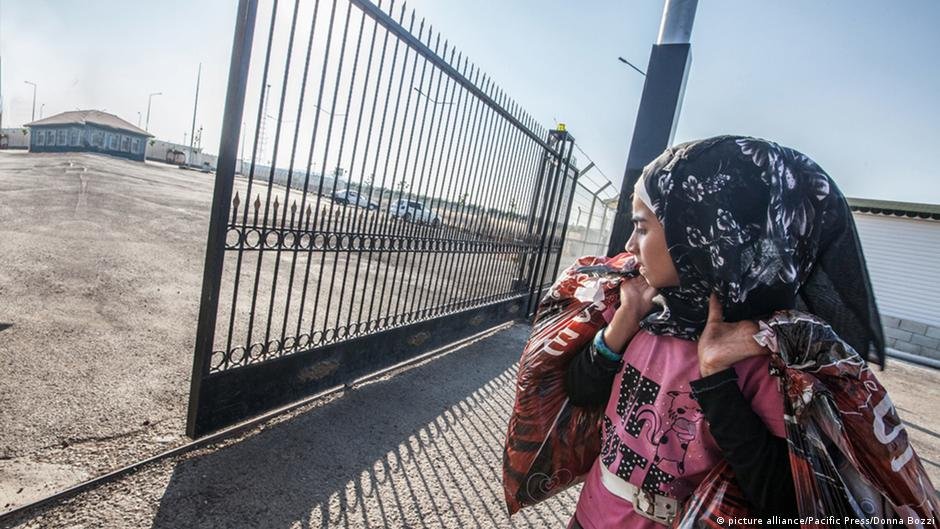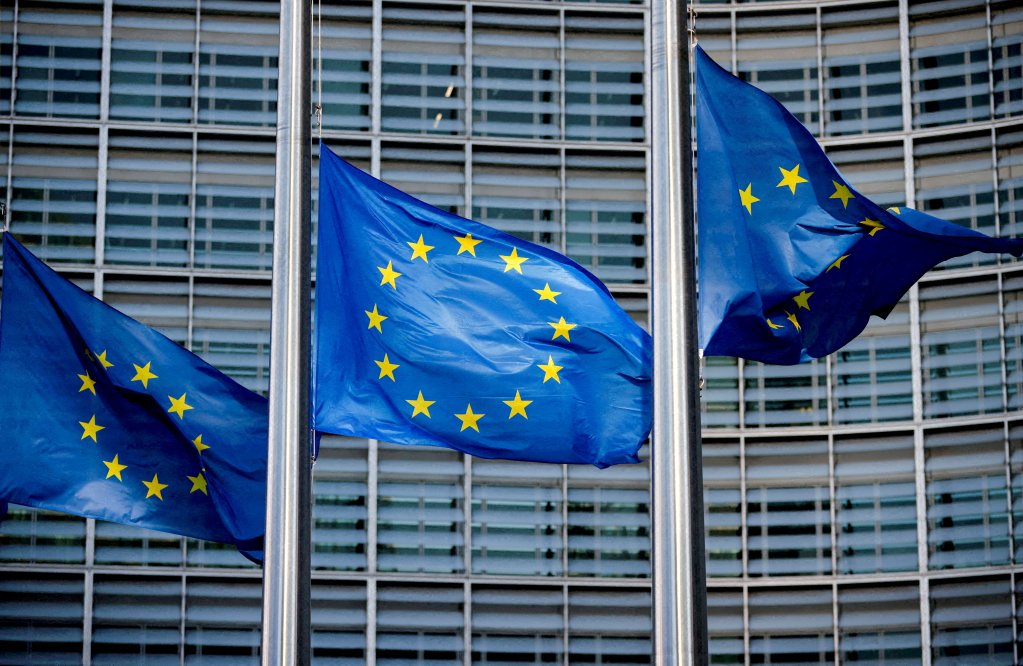A new investigation details instances of severe human rights abuses at Turkish migrant detention centers — including alleged coercion into signing "voluntary" deportation papers.
As EU member states gear up for a summit at which the issue of migration is likely to be one of the main talking points, a crisis brewing just outside the bloc's outer borders in Turkey could overshadow any constructive approach to migration management.
Reports detailing allegations of abuse against migrants and refugees in Turkey have been mounting for years since the European Union signed a six-billion-euro deal with the country in 2016 to hold back people trying to enter the EU using irregular means of travel.
The latest is an investigation published last week that sheds new light on the extent of the abuse as well as alleged details on other human rights violations involved.
The investigation led by Lighthouse Reports and supported by various European news outlets, including Germany's Der Spiegel weekly news magazine, France's daily Le Monde newspaper, Spain's daily El Pais newspaper, US American New Lines magazine, the international Politico digital news platform and several others highlights dozens of instances of migrants reporting abuse at the hands of Turkish officials as well as forced deportations to countries of origin like Syria and Afghanistan.

The investigative journalist platform, Lighthouse Reports refers to the alleged scheme as "one of the largest migration detention systems in the world — built and funded by the EU," while headlining its article "Turkey's EU-funded deportation machine."
According to the investigation, the EU is likely to be "aware that it is funding this abusive system, with its own staff raising alarms about it internally — yet senior officials choose to turn a blind eye."
Read AlsoSyrians in Turkey face deportation into an unknown future
Starved, beaten and sent to die --'voluntarily'
The report published by the journalism consortium specifically alleges that "hundreds of millions of euros" of EU funds were used to build deportation centers in Turkey where refugees and migrants were forced under duress and against their will to sign documents to be voluntarily repatriated. Lighthouse even highlights instances of "torture" — including holding migrants and refugees in refrigeration rooms for up to 12 hours allegedly to cooerce them into signing return papers.
The report published in Politico detailed the case of a man who appears to have been systematically starved while suffering an illness at one of the EU-funded facilities in Sanliurfa— a Turkish city located near the border with Syria. He reported arriving at the facility weighing 73 kilograms, falling ill there and losing almost 30 kilograms in body weight by the time of his deportation.

The version of the investigation published by Der Spiegel highlights 30 instances of beating and other forms of physical abuse, with one instance of a Syrian war refugee being beaten unconscious before being forced to sign repatriation papers. Another instance depicted in Politico details the case of a man who had both his legs broken before a Turkish official allegedly signed "voluntary" deportation papers on his behalf.
The same report also mentioned that there were reports of the deaths of two people after their alleged forced returns from Turkey — including one former special forces member, who was sent back to Afghanistan after fleeing the Taliban.
His family told reporters that Taliban operatives had shot him in the head and in the neck, after he returned to Afghanistan.
Read AlsoTurkey continues to host more refugees than anyone else, but for how long?
Lawless territory
Turkey's human rights watchdog TIHEK meanwhile has also documented multiple instances of such abuse and mistreatment at EU-funded migrant facilities in Turkey over the years, according to Politico.
One of the lawyers involved in a case that has made it to court says that in 2021 guards at a migrant facility in Izmir center beat up several migrants, which is documented by security cameras.
"We saw that they had bruises and lesions on their bodies," said the lawyer Duygu Inegollu.
However, according to an internal EU document viewed by the journalist consortium, only about one in five detained migrants and refugees managed to gain access to lawyers at all. The investigation reveals that in some instances refugees and migrants were told by officials that there simply was no time to deal with lawyers, considering the backlog of cases.
The French daily newspaper Le Monde highlighted cases, where they say individuals were kept away from legal recourse and sent back to their countries of origin.
It highlighted the case of a young HIV-positive transgender Syrian woman who was returned to the warn-torn country for "public health reasons" and that of an Iranian woman who had fled her country after converting to Christianity.
Both Iran and Turkey are Muslim nations; however, in Iran, the penalty for apostasy (renouncing a religion) is death.
Read AlsoHow one Iranian LGBTQ+ activist found a new life in Germany
Thorough investigative methods
The serious allegations published by Lighthouse Reports and its partners were corroborated by 37 migrants held at Turkish facilities as well as a total of over 100 sources, including individuals working for authorities in Syria and Afghanistan.
According to Lighthouse Reports, there is also evidence of "widespread and systematic beatings, no access to legal aid, overcrowding and precarious sanitary conditions" at the EU-funded facilities in Turkey.
"The EU deems it unsafe to deport Syrians and Afghans back to their home countries, yet makes Turkey a buffer zone to stop them reaching Europe – in return for billions of euros," Lighthouse Reports says in its article.
The fact that all these alleged abuses took place at migrant detention centers, which were financed using funds given to Turkey by the EU as part of the aforementioned 2016 deal, makes these latest reports of migrant abuse in Turkey a political issue whose ripple effects reach all the way to Brussels.
EU turning a blind eye to migrant plight in Turkey?
The EU has already called on the Turkish government to investigate the claims of abuse published by Lighthouse Reports and its partners. However, according to the investigation, this was not the first time that serious and credible reports of abuse reached EU officials.
According to the investigation, the European Commission for years "repeatedly ignored warnings" from various diplomats in charge of overseeing the scheme, NGOs publishing reports based on eyewitnesses they spoke to, whistleblowers from within civil society, and "even its own staff" — all while continuing to send funding to Turkey to keep building the centers to house migrants and refugees, where the alleged abuses took place.
As the EU awaits an official response from Turkish officials, EU Commissioner Ana Pisonero told the press that under the deal, "the enforcement and the protection of these formal rights remain the responsibility" of Turkey:
"It is the responsibility of the Turkish authorities to thoroughly investigate allegations of wrongdoing, and we urge them to do so," she added.
"If we receive evidence of breaches of human rights or other fundamental values related to any EU-funded program, then of course, we will address the situation," she told reporters in Brussels.
However, the investigation also revealed that such evidence already exists: According to the version of the report published by New Lines magazine, undated internal EU documents mention "many allegations of Syrians forcibly returned to Syria as well as migrants of other nationalities in removal centers coerced to sign voluntary return forms."
Read AlsoIs any part of Syria safe for deportations?
More outsourcing schemes likely?
Human rights organizations have for years criticized Turkey's handling of migrants and refugees, alleging pushbacks at sea and acts of violence as par for the course at migrant centers built using EU funds.
Most recently, Amnesty International said on X that Turkey was "endangering the lives of refugees and migrants," while stressing that the "European Commission must ensure no EU funds are used to violate human rights."
However, the trend of outsourcing migration facilities to places outside the European Union continues: Just days ago, Italy inaugurated asylum processing centers in Albania, which also is situated outside of the EU.
Italy's deal with Albania stipulates that migrants intercepted in the Italian Search-and-Rescue zone of the Mediterranean Sea will be brought to these centers on Albanian soil to be processed under Italian law.
Although it has attracted a great deal of criticism from NGOs and human rights groups, the Italy-Albania deal is being monitored closely by other EU members as a potential solution to the growing number of arrivals in the bloc, especially in the southern EU nations that border the Mediterranean.
Amid a steep rise in far-right support across the bloc, political parties across the political spectrum are scrambling to find new solutions to appease voters.

Read AlsoRise of right in EU risks politicizing Syrian refugee issue, activists warn
Until recently, a renewal of the EU-Turkey deal was also on the table as one potential approach to limit the number of people reaching the European Union. However, it is unclear if in the face of the latest revelations the scheme can be extended in its current form.
That said, EU Commissioner Pisonero also highlighted the fact that in addition to the six million euros given to the Turkish government under the 2016 deal already, the bloc had provided Turkey with nearly twice as much in funds over the years to help control migration to Europe.
Since 2012, the total bill has reached nearly 10 billion euros, with another one billion euros already pegged for the ongoing year.
Turkey rejects allegations
Turkey meanwhile continues to claim that its immigration management administration department (Goc Idaresi Bakanligi) continues to conduct itself "in accordance with law, human rights and our values of civilization throughout."
The department, which underlies the direction of the Ministry of the Interior, told Politico that all deportations were carried out in line with Turkish law prohibiting the return of refugees to places where they could suffer persecution, such as Syria.
It added that allegations of Afghans being forced to sign voluntary return papers and being sent back were "untrue."
Read AlsoTurkey's Erdogan seeks dialogue with Syria's Assad amid tensions over refugees
However, there's documentation to the contrary: Politico highlights that in 2022, the European Court of Human Rights (ECHR) found Turkey guilty of several rights violations in the case of a Syrian man who had indeed been forced to sign a voluntary return form in 2018 and was then deported accordingly.
Furthermore, an unnamed employee of a charter airline told Politico that more than 100,000 people had been deported from Turkey to Afghanistan since the Taliban took over three years ago, adding that this had become the airline's "largest and most profitable operation."
Turkish President Recep Tayyip Erdogan meanwhile appears to be unmoved by these discrepancies: following a recent cabinet meeting, he simply told the public that the government was "also taking measures against new irregular migration flows across the borders" and that "(o)ur efforts to prevent irregular migration at the source continue" — without detailing what price refugees and migrants might have to pay to fulfil that endeavor.
